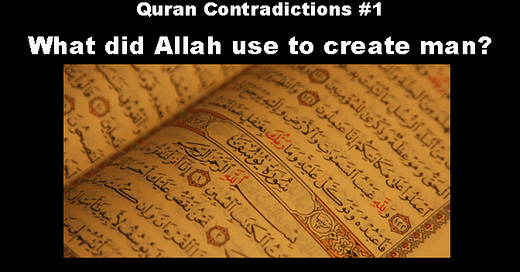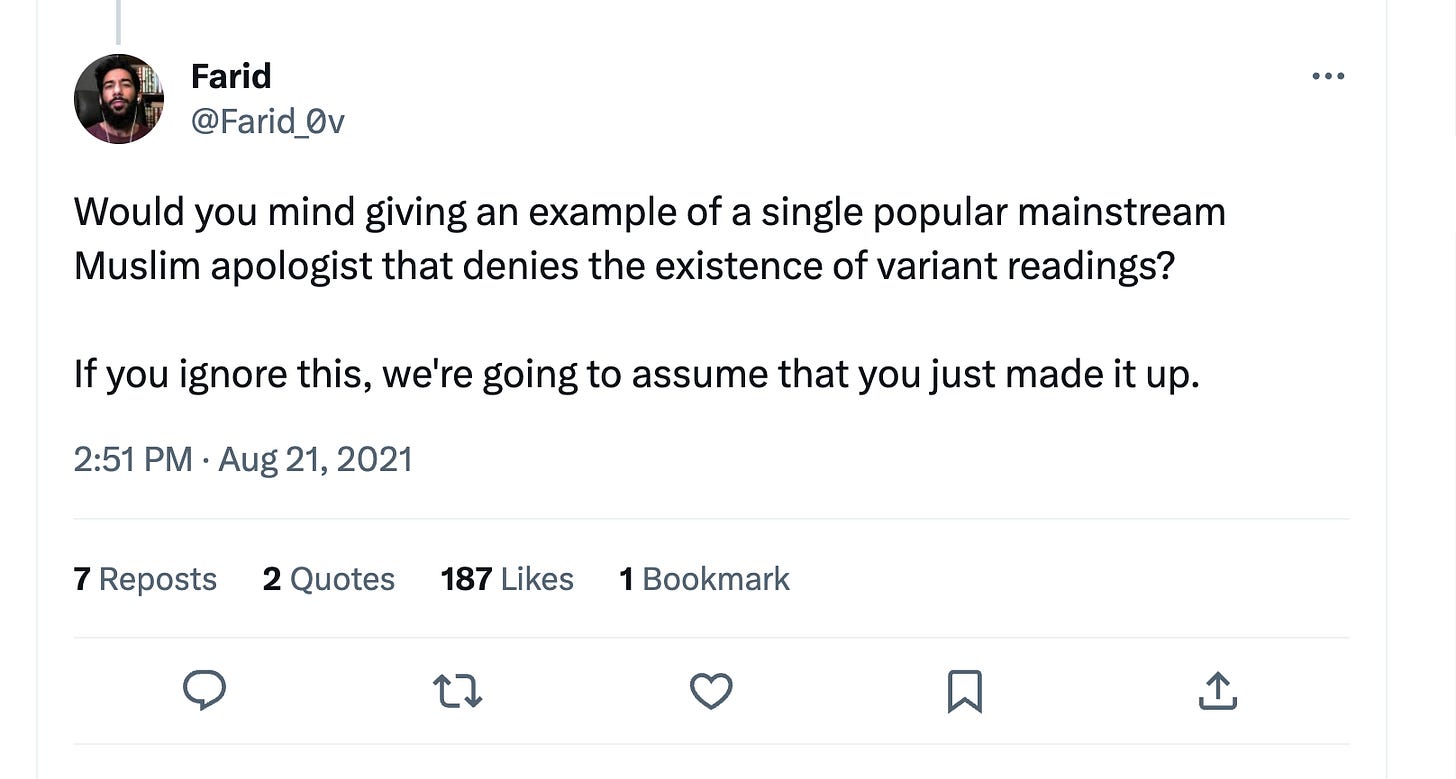The CLAIM of PERFECT PRESERVATION of the QUR'AN
It’s a massive overstatement to say the Qur’an has been perfectly preserved. Here are some reasons we can safely say the Qur’an has *not* been perfectly preserved.
THE CLAIM of PERFECT PRESERVATION of the QUR'AN
Muslims often tell us that evidence for the miraculous nature of the Qur’an is its “perfect preservation”. This argument can be found in Surah 15:9: “We have, without doubt, Sent down the Message; And We will assuredly Guard it (from corruption).”
The apologists of Islam claim the same. Well-known Pakistani scholar Maulana Muhammad Ali wrote:
“The Qur’an is one, and no copy differing in even a diacritical point is met with in one among the four hundred millions of Muslims.”
Ali wrote this in 1921. But the argument survives. Ali continues:
“There are, and always have been, contending sects, but the same Qur’an is in the possession of one and all.”
These quotes come from his popular work, Muhammad and Christ. The last quote even denies any copying errors!
“A manuscript with the slightest variation in the text is unknown.”
Ironically, some Muslims will deny that other Muslims say this. They will accuse Christian apologists of making it up. Here’s an example from X / Twitter:
Well, here’s yet another example. In the readily available book, "What Everyone Should Know About Islam and Muslims", Suzanne Haneef claims that “the Holy Qur’an is the only divinely revealed scripture in the history of mankind which has been preserved to the present time in its exact original form.”
What does this mean? This means that “the Qur’an has been preserved in the Arabic wording in which it was revealed to Prophet Muhammad (peace be on him) and in the exact order in which he himself placed it as commanded by Divine revelation.” Many Muslims who believe this of course see this as a sign of supernatural intervention. *link below to an intro level lecture I did on this subject*
BUT … THE QUR'AN WAS NOT PERFECTLY PRESERVED
Islamic sources report that the Qur’an was originally memorized by Muhammad’s early devout followers. However, Islamic sources also report that many of these individuals were killed in a battle shortly after Muhammad’s death. According to early Islamic tradition, Muhammad’s scribes wrote the words of the Qur’an on pieces of paper, stones, palm leaves, shoulder blades, ribs, and bits of leather. This means the Qur’an was not in any singular place, but its contents were essentially scattered about.
But it wouldn’t stay that way, of course.
Abu Bakr told Zayd, a contemporary and follower of Muhammad, to “search out the Qur’an and gather it together.” Zayd responded, “Accordingly, I sought out the Qur’an: I gather it together from leafless palm-branches and thin white stones and men’s breasts.” So there’s a step towards the modern Qur’an. But the process isn’t done.
During the reign of Uthman, the third Muslim Caliph, it was reported that several Muslim communities were using different versions of the Qur’an. Zayd was called in to oversee an official revised version of the Qur’an. The result, called the Uthmanic recension, is essentially the version that remains to this day. Uthman’s recension of the Qu’ran is not, by definition, the original version that came directly from Muhammad. *link below to an audio interview I did w/the late Nabeel Qureshi on this*
To be fair, it’s still true that the modern Qur’an is a pretty good copy of the 7th century Uthmanic recension. But it’s not true that our Qu’ran is exactly what they had back then. (see John Gilchrist, Jam’ al-Qur’an: The Codification of the Qur’an Text (Benoni, South Africa: Jesus to the Muslims, 1989). Let’s demonstrate this historical fact.
In Materials for the History of the Text of the Qur’an, archaeologist Arthur Jeffery related the state of the Qur’anic text prior to its standardization under Uthman:
“When we come to the accounts of ‘Uthman’s recension, it quickly becomes clear that his work was no mere matter of removing dialectical peculiarities in reading [as many Muslims claim], but was a necessary stroke of policy to establish a standard text for the whole empire.”
Jeffery’s work reveals there were several different texts prior to Uthman’s revision:
“There were wide divergences between the collections that had been digested into Codicies in the great Metropolitan centres of Madina, Mecca, Basra, Kufa and Damascus. … Uthman’s solution was to canonize the Madinan Codex and order all others to be destroyed.”
At one point (pp. 7-8), Jeffery concludes: “there can be little doubt that the text canonized by ‘Uthman was only one among several types of text in existence at the time.”
Watt, in discussing the variations between just two codices—that of ibn Mas’ud of Rufa and ibn Ka’b of Syria— writes, “No copies exist of any of the early codices, but the list of variant readings from the two just mentioned is extensive, running to a thousand or more items in both cases.” [Watt, Bell’s Introduction to the Qur’an, 45.]
More recently, the website Answering Islam and others have documented how extensive these variations really are. *below is a lecture by Jay Smith on the subject*
VARIATIONS IN THE QUR'AN?
Masud was one of the few people authorized by Muhammad to teach the Qur’an as authoritative (Sahih al-Bukhari, Vol. 5, p.96). Sunni Muslims say they accept Masud’s Sahih tradition. Yet … the Ibn Masud Codex of the Qur’an has a multitude of variations from the Uthmanic recension.
For example, in the second sura alone, there are nearly 150 variations! Jeffery spends 94 pages on variations between the two readings. The variant readings are not just a matter of dialect, as some claim. Jeffery demonstrates that some variations involve a whole clause; others omit complete sentences. Jeffery concludes [See Watt, 9–10]:
“It is quite clear that the text which ‘Uthman canonized was only one out of many rival texts.”
and
"There is grave suspicion that ‘Uthman may have seriously edited the text he canonized.”
CHANGES IN THE ORIGINAL TEXT OF THE QUR’AN
Additionally, Islamic tradition itself reveals things not found in the present Qur’an. For example, A’isha, one of Muhammad’s wives, said:
“Among what was sent down of the Qur’an were ten well known (verses) about—Suckling, which prohibited: then they were annulled by five well known ones. Then the Apostle of God deceased and they are what is recited of the Qur’an.”
Another example not found in today’s Qur’an is what Umar said:
“Verily God sent Muhammad with the truth, and He sent down upon him the Book, accordingly the Verse of Stoning was part of what God Most High sent Down: the Apostle of God stoned, and we stoned after him, and in the Book of God stoning is the adulterer’s due.”
This original of 24:2 was apparently changed: one hundred stripes replaced stoning as the punishment for adultery.
More verses illustrate changes in the original text of the Qur'an. In an extremely controversial (and early) Meccan revelation, Muhammad apparently allowed intercession to certain idols:
Did you consider al-hat and al-Uzza
And al-Manat, the third, the other?
Those are the swans exalted;
Their intercession is expected;
Their likes are not neglected.
Later, Muhammad received another revelation canceling the above last three lines. In their place, he substituted Sura 53:21–23. It omits the part about interceding to these gods. In the meantime, both versions had been recited publicly!
The explanation? Satan deceived the Prophet and inserted the false verses without his knowing it.
W. St. Clair-Tisdall, in his landmark 1904 book, A Manual of the Leading Muhammedan Objections to Christianity, points out that even in the present Qur’an there are some variations (London: Society for Promoting Christian Knowledge, 1904, p 60):
٥Surah 19:35 for tantaruna, some read yamtaruna
١Surah 28:48 some read sahirani for sihrani
٢Surah 32:6 after ummahatuhum, one reading adds wa hua abun lahum
٣Surah 34:18 for rabbana ba’id, some read rabuna ba’ada
٤Surah 38:22 for tis’un, another reading is tis’atun
Even today, despite the common (mis)conception, not all Muslims accept the same version of the Qur’an. Shi’ite Muslims are in the minority but are the second largest Islamic sect in the world at over 100 million followers. They claim that Caliph Uthman intentionally eliminated many verses from the Qur’an that spoke of Ali.
[Ibid., 59. Also see B. Todd Lawson, “Note for the Study of a ‘Shi‘i Qur’an,” in Journal of Semetic Studies (Autumn 1991), vol. 36, no. 2, 279–96.]
IF THE QUR’AN WAS PERFECTLY PRESERVED, WHAT WOULD THAT MEAN?
Let’s pause here and take stock of the argument. Here’s what we must realize: even if the Qur’an was perfectly preserved, this would not prove its divine inspiration. Something could hypothetically be perfectly preserved without being from God.
L. Bevan Jones summed up the matter well on page 62 of The People of the Mosque (1932):
“while it may be true that no other work has remained for twelve centuries with so pure a text, it is probably equally true that no other has suffered so drastic a purging.”
The purging took place early so the Muslim claim that it has been preserved perfectly since is misdirected.
Even if the present Qur’an were a perfect word-for-word copy of the original as given by Muhammad, it would not necessarily prove the original was inspired by God. All it would demonstrate is that today’s Qur’an is a carbon copy of whatever Muhammad said; it would say or prove nothing about the truth of what he said.
The crucial question is whether the original is Allah’s Word not whether they possess a perfect copy of it. Unfortunately, for Muslim apologists, the answer in both cases is clearly in the negative.
*Some sections of this post are adapted from Chapter 9 of Answering Islam: The Crescent in Light of the Cross by Norman L. Geisler and Abdul Saleeb (Grand Rapids, MI: Baker, 2002).





